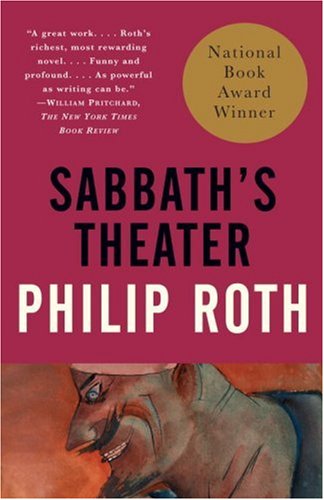Mickey Sabbath is a retired puppeteer living in New England. Although "retired" may be the wrong word for someone who was hounded into joblessness for "taking advantage" of a younger student. Which is basically the story of his life--where Sabbath finds sex liberating, and wears his fetishes and licentiousness on his sleeve, few others share his openness, like the cop who arrested him for exposing a woman's breast (with her tacit consent) during an adult puppet show near Columbia University in the 60's.
But all that is mostly flashback. When the novel opens, Sabbath is forced to deal with the sudden death by cancer of his longtime mistress Drenka, his most committed and adventurous sexual partner. Drenka's death forces Sabbath to force his own mortality, but also to masturbate on her grave:
Even dead, Drenka gave him a hard-on; alive or dead, Drenka made him twenty again. Even with temperatures below zero, he would grow hard whenever, from her coffin, she enticed him like this. He had learned to stand with his back to the north so that the icy wind did not blow directly on his dick but he still had to remove one of his gloves to jerk off successfully, and sometimes the gloveless hand would get so cold that he would have to put that glove back on and switch to the other hand. He came on her grave many nights.
I wanted to read Sabbath's Theater because of a passage in James Wood's How Fiction Works where he talks about how successfully Philip Roth combines low registers ("cunt," "tits," etc.) with high registers ("even the toilet bowl cleaners appeared to have been designed by Brancusi"), which Wood considers the mark of sophisticated prose. More than that, Roth's variegated style turns Sabbath into a proponent of the intellectual and moral joy of sexual transgression, rather than a simple hedonist. (I was expecting someone like John Self from Money, but that's not Sabbath at all). It's no surprise that Sabbath compares himself to Falstaff, who also justifies his appetites by rhetorical flourishes.
And yet part of Sabbath's reckoning with his past requires facing the harm his proclivities can cause; for every encounter with a puritanical cop there is a time in which he buys liquor for a girl in rehab in exchange for oral sex. Sabbath wavers between extreme guilt and extreme defiance, unable to differentiate until the end, I think. Throughout the book he describes the agony of his first wife's abrupt disappearance, and takes to telling people, "I killed my wife"--but is it an admission of wrongdoing, or just another farce, another puppet show?
I read Portnoy's Complaint years ago and didn't care for it, yet I really enjoyed Sabbath's Theater. Portnoy, to the best of my recollection, was a chronicle of sexual repression and frustration; Sabbath's Theater represents something like a release from that, and I think it succeeds on that sheer, liberated audacity.


No comments:
Post a Comment